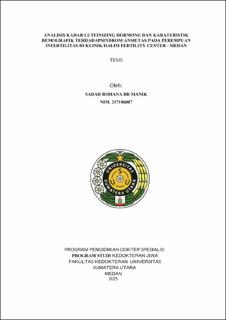| dc.description.abstract | Background : Infertility is a global reproductive health problem that affects millions of people worldwide. Female infertility is infertility caused by factors in women, such as ovulation disorders, egg depletion, reproductive system disorders, or chronic diseases. Primary infertility occurs in those who have never given birth, while secondary infertility involves those who have given birth or had a miscarriage. The purpose of this study was to determine the factors associated with anxiety symptoms in infertile women who are undergoing infertility treatment.
Methods : This cross-sectional study was conducted between September 2024 - October 2024, involving 76 people with infertility, consisting of age, education level, employment status, monthly income, history of abortion, duration of infertility, BMI, and LH history, measured through blood plasma examination, while to assess the symptoms of anxiety assessed using GAD-7 (Generalized Anxiety Disorder), Multivariate analysis was used to analyse the relationship between LH and GAD-7.
Results : This study found that the employment status showed 45 subjects (59.2%), the most education level variable was college 47 subjects (61.8%), the most income variable was > UMR 57 subjects (75%), the most abortion history variable was never 66 subjects (86.8%), the most BMI variable was normoweight 45 subjects (59.2%). The most GAD-7 variable was moderate 26 subjects (34.2%).
Conclusion : Employment Status shows that working women tend to have better access to infertility treatment as better economic factors improve access to infertility health services. Higher levels of education are more accessible for infertility treatment, these findings suggest that higher levels of anxiety are associated with hormonal dysregulation that affects ovulation and reproductive function. | en_US |


